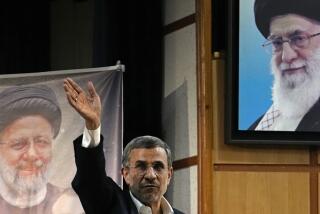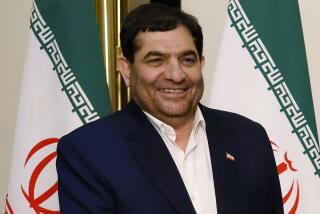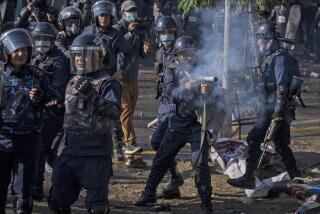Shah’s Son Dreams of Returning as Monarch of Iran to End Nation’s ‘Nightmare’
- Share via
PARIS — The son of the toppled Shah of Iran admits that his father committed excesses in ruling Iran but claims that the Iranian people now want the Pahlavi dynasty back to end their “nightmare.”
“I know in my heart that they want me,” Reza Pahlavi said in an interview. “But I’m not going to claim to you today that the people will say that.”
For some Iranians, the 26-year-old Pahlavi is already known as “Your Majesty.” For others he is a remembrance, often bitter, of things past. For practical purposes, he is a king without a throne or even a country, and many Iranian exiles dismiss him as an empty threat to Ayatollah Ruhollah Khomeini’s eight-year-old revolutionary regime in Tehran.
“Where are his forces? In his imagination,” says Abolhassan Bani-Sadr, ex-president of Iran.
The young Pahlavi contends that he has civilian and military “resistance cells” at work, but he will not elaborate on their activities.
He proclaimed himself Shah Reza II in 1980 on his 20th birthday, soon after his father, Shah Mohammed Reza Pahlavi, died in exile in Egypt. But the younger Pahlavi quickly retreated into silence in the United States, where he was trained as a pilot and studied at Williams College in Massachusetts.
Political Debut
He is now making something of a political debut, including a series of appearances in Paris--nerve center of Iran’s exiled opposition--in an effort to to place himself in the front line of the struggle to bring down Khomeini’s Islamic republic.
“My goal is to free Iran from the rule of the terrorists (who) have taken our country hostage,” Pahlavi said. “My dream is that my country be freed as soon as possible from this nightmare.
“The question that remains is when to launch the final move against the regime.”
His words echo those of other opposition leaders, including several brands of monarchists. All claim popular support inside Iran and the military backing to make it meaningful.
The boyish Pahlavi, surrounded by a bevy of advisers, is articulate, fluent in English and French and apparently well schooled in his nation’s political history.
Some exiled monarchists clearly favor the restoration of a strong king, with more than figurehead power. But Pahlavi stresses a wish to become a true constitutional monarch, “the type of monarch you can find today in Britain, Spain or Sweden.”
“The shah remains a symbolic figure who can keep moral integrity intact,” he said. “I do not believe the monarchy of the future in Iran could have any other form.”
Says Father Overstepped Power
He acknowledged that his father, who bore the title “King of Kings,” exceeded Iran’s 1906 constitution, which was meant to limit the power of the monarch.
“One of the reasons there was a reaction to my father late in the 1970s was (that people) wanted the constitution to be applied,” he said.
The shah, in a single-minded effort to transform Iran into a major power, crushed dissent and policed his country with the dreaded SAVAK secret police, at the same time that the 1970s oil boom was enriching and corrupting Iran’s elite.
“Very rapid growth disturbed a little the natural fibers of our society. People had a hard time keeping up,” Pahlavi said.
“At the end there was a . . . reproach to my late father that the constitution was not properly applied, that my father had taken too much power into his own.”
Asked about his followers’ anti-Khomeini activities, the younger Pahlavi would not discuss details.
“Part of the nature of the game is to deal in absolute secrecy,” he said. “Our major operational and tactical networks can’t be exposed until the final moment.”
But he said that, in meetings outside Iran, he has discussed his country’s future with members of the Islamic clergy and other important Iranian groups.
More to Read
Sign up for Essential California
The most important California stories and recommendations in your inbox every morning.
You may occasionally receive promotional content from the Los Angeles Times.













